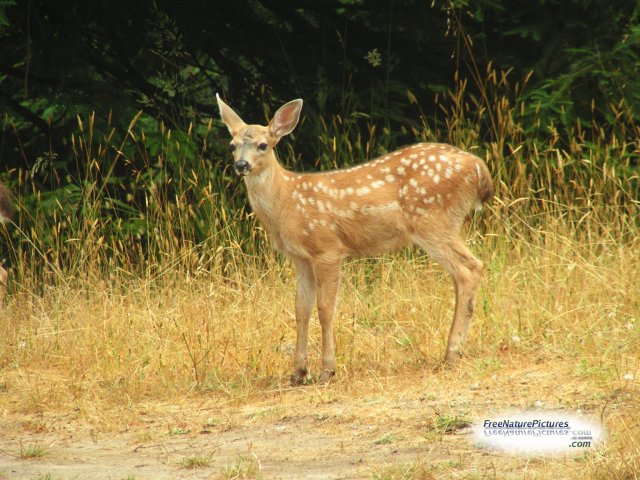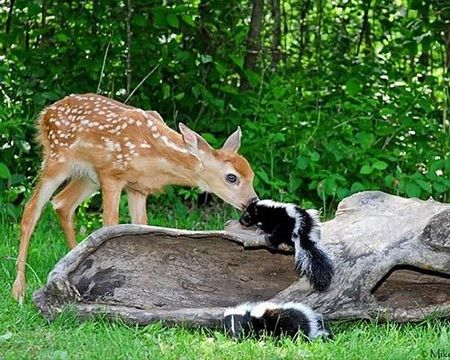

THE PET DEER.
WHEN my grandmother was a little girl, her father moved with his family to the then far West, and settled in the northern part of the State of Ohio. They came in a large covered wagon, and were several weeks on the road. At night they camped by the roadside or slept in their wagon. It was some time in May that they reached their new home in the forest. The neighbors were few and far between, but their hearts were warm, and they gladly welcomed the family to their homes until the father had finished them a cabin in the woods.
Everything was new and strange to the children, of whom there were four, grandmother, and two boys who were older than she, besides the baby, scarcely two years old. To them the new log house seemed grander than a king's palace, and a happy day it was to them when they moved into it. The new, wild life greatly pleased them, and they did not miss the home and friends left in the East as their parents did; nor did they realize the want and hard work, which were before them.
First, a few trees were cut down around the house, and some corn and beans planted among the stumps; and then the father and the boys went hard at work to clear and prepare ground enough to sow some wheat on in the fall, so that they might have bread for the next year. Little Lucy, for that was grandmother's name, found plenty to busy her in caring for the baby brother and helping mother with chores about the house, but she began sometimes to be lonely; for the boys had to work all day, and there were no little girls near enough to come and play with her, as they had done in the old home. And so the summer passed away.
But one day in the fall, father and the boys had been away hunting; and at night they came bringing with their game a little live fawn, which, they said, was to be a pet for Lucy, so that she would not get so lonesome. It was a pretty, delicate little creature, but it trembled with fear, and seemed so afraid that Lucy was very sorry for it. In the morning the boys built a pen for it, and Lucy finally made it drink some milk, and eat the tender grass she brought. After a while it grew so tame that they could let it out of the pen, and it would follow Lucy about like a little dog. The fawn was really a great deal of company for Lucy, and many were the happy hours she spent playing with the sportive little thing. She named it Nannie, and as soon as it heard her call its name, it would come bounding toward her like a playful kitten.
The boys made a nice place for the fawn in the new log barn, which was built that au- tumn; so, much to Lucy's delight, they were able to keep it through the long cold winter.
But Nannie seemed as glad as the children to see the warm, bright days of spring return, and to have her freedom once more. During the early part of the summer she stayed around the house, and would never go out of sight except to follow some of the family along the winding forest paths or to visit some of their distant neighbors. But about the middle of the summer, Nannie began to go off alone into the woods and stay several hours a day, but always returning before nightfall. Finally she would be gone most all day, and at last one night she did not come at all. Lucy thought her pet would surely return the next day, but it did not; and they never saw it again. They all missed it very much, for it had come to seem almost like one of the family. Whether its deer friends coaxed it to stay with them, or whether some hunter shot it, thinking it a wild deer, they never knew; but it was a long time before Lucy was comforted for the loss of her pet.
